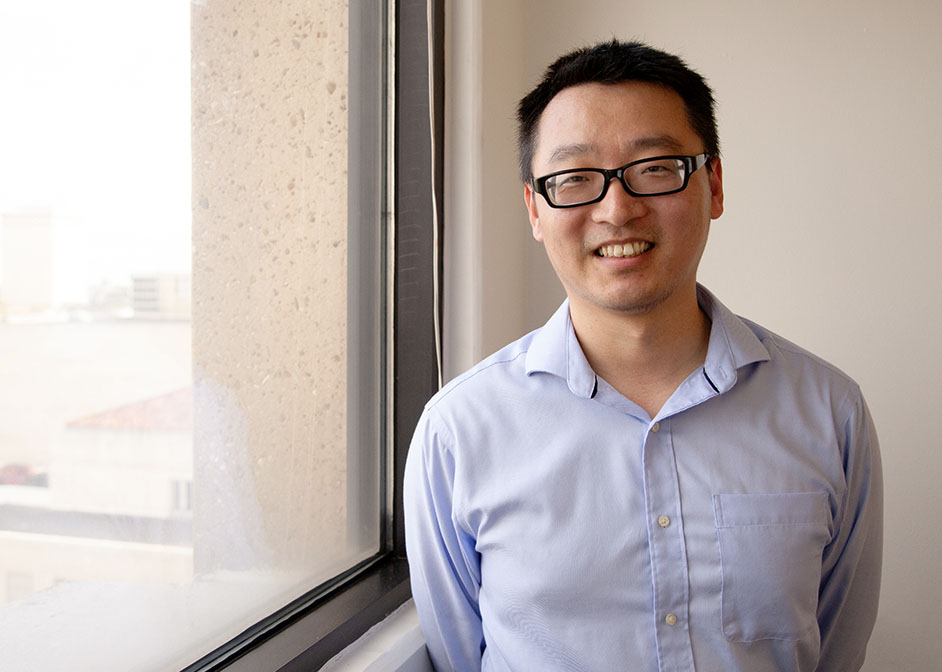Panruo Wu to Use Out-of-the-Ordinary Ideas to Educate About Building Software
Computer scientist Panruo Wu aims to start an ambitious set of projects through his newly granted five-year, $528,733 CAREER award from the National Science Foundation.

These prestigious awards recognize early-career faculty who can become academic role models to students in the classroom and who can advance the mission of their department or university.
Wu joined the University of Houston’s College of Natural Sciences and Mathematics in 2018 as an assistant professor in the Department of Computer Science. Much of his work concentrates on high performance computing, data driven computations and high-performance numerical software.
"I feel happy and encouraged,” Wu said. “This award provides multiple years of support for myself, my students, equipment and travel. It will be central in carrying out my proposed research.”
Finding a Solution for Vast Amounts of Data
Wu’s research focus of his CAREER award is on the development of algorithms and open-source software that use high-level computer processors.
“We have powerful processing units coming out of every big company – Google, Apple, Intel, Nvidia and startup companies. They all try to accelerate the training of neural network applications,” Wu said. Neural networks, also known as artificial neural networks, are codes and programs set to mimic a human brain and are used in artificial intelligence applications.
Wu seeks to bring the capability of the processing units to a broader set of applications, not just artificial intelligence. These include scientific computing and data driven computing.
Scientific computing includes simulations of physical, chemical or biological processes. Data-driven computing can include work with the vast amounts of data coming out of the internet, cellphones and smartphone cameras. All of it needs to be processed.
Even within the oil and gas industry, large amounts of data come from sensors and images, “which could provide valuable information,” he said.
Accelerating through New Technology
Through his CAREER award, Wu aims to acquire tensor processing units to carry out his work. These special units accelerate matrix operations. Matrices, put simply, are sets of numbers laid out in rows or columns that represent math equations or data.
Apple, he said, has a new tensor processor that also comes with a neural engine. Wu hopes to acquire this and other Apple computers and hardware, along with cloud resources from Google.
How to Apply Mathematical Concepts to Careers
In addition to mentoring his four Ph.D. students, Wu will develop a new class for undergraduates on how to apply concepts learned in college to real-world scenarios they may face in their computing jobs after graduating.
“For any engineering or science major, they learn calculus, linear algebra, probability,” said Wu. “This course will put all of that into use by teaching students how to learn from data. I think it will be a great course to help students find out that what you learn in school can be useful.”
The class will also involve probability because many machine learning models are statistical in nature, he said.
He plans to launch the class in the spring 2023 semester at the earliest.
Apprenticeship through Video
Another project Wu plans to undertake with his grant involves undergraduate and graduate students.
Building software is certainly a science but also in part, an art, Wu said. One of the most effective ways in which students learn, he said, is through video.
"Of course, you must learn exercises from textbooks, lectures and homework. However, more importantly, you need to learn from professionals who build software for a living. There are certain techniques you learn implicitly by working with professionals, or, by watching them do it.”
People on YouTube upload their live coding sessions to teach others their tricks. His vision for undergraduate and graduate students is for them to work together to create coding videos, then post their work online so it gains exposure.
Observing those with coding experience and applying their ways to your own work is similar to the role of an apprentice, said Wu, “like learning how to become a carpenter. It is a craft.”
- Rebeca Trejo, College of Natural Sciences and Mathematics